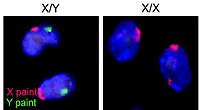
Photo from wikipedia
A major challenge in stem cell differentiation is the availability of bioassays to prove cell types generated in vitro are equivalent to cells in vivo. In the mouse, differentiation of… Click to show full abstract
A major challenge in stem cell differentiation is the availability of bioassays to prove cell types generated in vitro are equivalent to cells in vivo. In the mouse, differentiation of primordial germ cell-like cells (PGCLCs) from pluripotent cells was validated by transplantation, leading to the generation of spermatogenesis and to the birth of offspring. Here we report the use of xenotransplantation (monkey to mouse) and homologous transplantation (monkey to monkey) to validate our in vitro protocol for differentiating male rhesus (r) macaque PGCLCs (rPGCLCs) from induced pluripotent stem cells (riPSCs). Specifically, transplantation of aggregates containing rPGCLCs into mouse and nonhuman primate testicles overcomes a major bottleneck in rPGCLC differentiation. These findings suggest that immature rPGCLCs once transplanted into an adult gonadal niche commit to differentiate towards late rPGCs that initiate epigenetic reprogramming but do not complete the conversion into ENO2-positive spermatogonia.Human embryonic stem cells can be differentiated in vitro into primordial germ cell-like cells (PGCLCs) that resemble early primordial germ cells (PGCs). Here the authors transplant PGCLCs generated from rhesus macaque iPSCs into mouse and rhesus macaque seminiferous tubules, which matures these into late PGCs and spermatogonia-like cells.
Journal Title: Nature Communications
Year Published: 2018
Link to full text (if available)
Share on Social Media: Sign Up to like & get
recommendations!